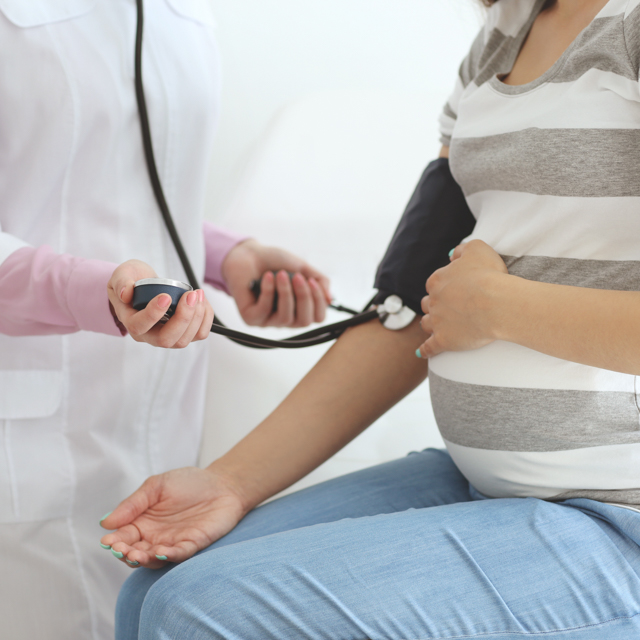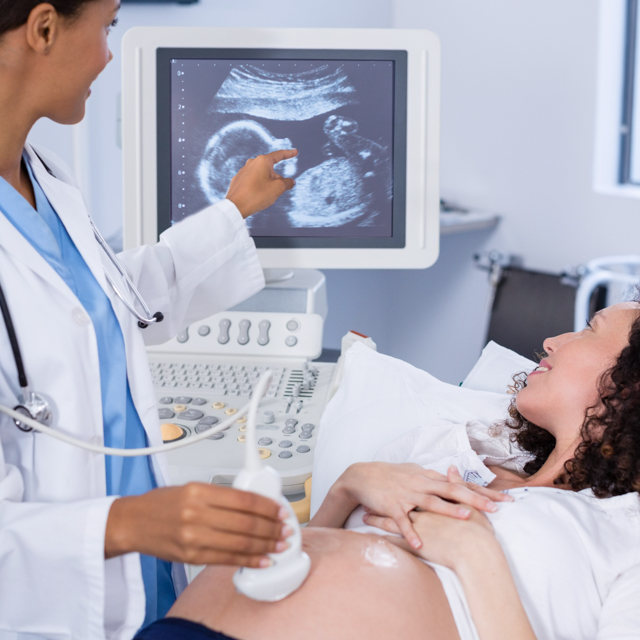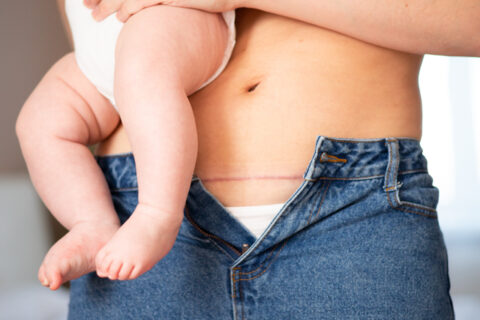Preparing for a healthy pregnancy
Whether you’ve been building healthy habits for a long time or a new pregnancy is motivating you to refocus on your health, your prenatal care provider will come alongside you to help you take care of your health both during and after pregnancy.
“You are not in this alone,” said Marylou Smith, a certified nurse midwife with Vanderbilt Women’s Health. “With consistent prenatal care, you are building a team that includes, you, your baby, your health care provider and your main support people.”
Here, Vanderbilt Health prenatal care experts offer tips and advice on how to have a healthy pregnancy, a healthy delivery and beyond with this guide to a healthy pregnancy.
What should I expect throughout the stages of pregnancy?
The earliest symptoms of pregnancy include breast tenderness, mood changes and a missed period. By the second month, you may feel sick to your stomach and experience pregnancy fatigue. During the first trimester of pregnancy, your belly and breasts will grow and clothes may start to feel tight. You may also experience headaches, dizziness, heartburn or constipation.
It’s common to have 10 prenatal visits during a pregnancy. During the first prenatal visit, you’ll discuss family and medical history, past pregnancies and your lifestyle. The provider also will:
- check height and weight;
- do blood and urine tests (if needed);
- set all regular visits for the rest of your pregnancy.
You’ll likely have one visit every four to six weeks to start. After 28 weeks, you’ll be seen more often.
In the second trimester, you’ll start to feel your baby move. You’ll also feel more pressure on your bladder, stomach and other organs and may see a dark line emerge on your belly, called the linea nigra. You will also start gaining weight at a more regular pace — around 1 pound a week until you give birth.
As your baby grows during the third trimester, you may feel short of breath as your organs become more cramped. Your breasts will continue to grow, and milk may leak from your nipples. You will also start to feel minor contractions called Braxton-Hicks contractions. Also known as “false labor,” Braxton-Hicks contractions tend to be irregular and do not get stronger over time.
Expert care for you and your baby
What should I expect in terms of testing when pregnant?
First trimester tests include:
- A blood draw to scan for anemia, blood type, HIV and other conditions
- Urine samples
- Pelvic exam
- An ultrasound to confirm pregnancy, verify gestational age and determine if you’re carrying multiples
- The option to receive non-invasive prenatal testing, a blood test that screens for Down syndrome and other chromosomal conditions — and also allows you to find out the baby’s sex
Second trimester tests include:
- Urine tests
- 20-week ultrasound to see the size, position and number of babies, check for physical issues and see the sex of the baby
- Blood sugar test to check for gestational diabetes
Third trimester tests include:
- Urine tests
- Repeat testing for anemia, HIV and other conditions
- A swab for Group B streptococcus, a type of bacteria. If you’re positive, your obstetric care team will give you medicine during labor to lower the chance that your baby gets the bacteria.
If an abnormality is detected on one of your screenings, diagnostic testing may be offered. “An amniocentesis is a procedure where you sample the baby’s amniotic fluid,” said Dr. Rolanda Lister, a maternal-fetal medicine specialist with Vanderbilt Women’s Health. “Typically an amniocentesis is done to get genetic information or if there is concern for an infection.”
What should I eat during pregnancy?
A healthy, well-balanced diet is the key to pregnancy nutrition — and is one of the best things you can do for yourself and your baby.
Try to eat a variety of colors and types of vegetables — the darker the color, the more nutrients it has. Eat lean proteins, choosing meats that are grilled, roasted or baked. Pick whole grains when you can and make sure to include foods that have lots of calcium, like milk, yogurt and cheese.
Here are some foods to avoid:
- Raw seafood and sushi
- Fish high in mercury: shark, tilefish, swordfish, king mackerel
- Hot dogs and deli meats (unless you heat them until they’re steaming hot)
- Refrigerated meat spreads
- Store bought deli salads
- Raw, unpasteurized juice, milk and food products (soft cheeses: camembert, brie, feta, cheese with blue veins, queso blanco, panela and queso fresco)
- Alcohol: beer, wine, liquor, mixed drinks and malt beverages
- Foods that have gone bad (contaminated)
Explore more about Pregnancy

Discomfort during pregnancy: 12 common symptoms

Making the most of your prenatal care

What to expect at your 20-week ultrasound
What is a birth plan?
The term refers to any preferences or special requests related to labor, birth and immediate postpartum care. Consider this birth plan template as you prepare to welcome your baby, talking through the following:
- Do I want to walk around when I’m in labor and choose my labor positions?
- Who will be with me during labor and birth? What type of support do I want from them and my other support people?
- Do I want photos and video taken during labor or birth?
- How do I want to manage pain during labor and birth?
- What types of comfort actions do I want (music, massage, or acupressure)?
- What medicines will I want to take to help me with labor pains?
- To help speed up labor, what procedures or medicines will I consider?
- What types of care and number of days in the hospital does my insurance cover?
- What choices will I consider if any unexpected events happen?
- If I had a cesarean section in the past, is vaginal birth after cesarean a choice?
- How do I want to feed my baby?
It’s not a bad idea to bring a written copy of your birth plan to a prenatal visit in the last month of pregnancy. A copy can easily be put in your chart, but don’t forget to bring an extra in your birth bag just in case.
What is an epidural — and do I have other options for pain control?
As part of your birth plan, you can use many different tools to help you handle the pain of contractions and birth. Contractions are when the muscles of your uterus get tight in order to help push your baby out. You may choose to use relaxation techniques or pain medicine.
“I like patients to know that every delivery is different,” said Dr. Camille Robinson, an obstetrician with Vanderbilt Women’s Health. “Every situation is different, and it’s not a failure to need or want a pain medicine. I think some patients think that if they don’t go ‘natural,’ that something’s wrong.”
“By far, the most common and most effective method of pain medicine is to get an epidural,” Robinson said. An epidural is regional anesthesia delivered to your back through a catheter. “Because it’s continuous, it’s long-term,” she added. “It can be there for hours and does not affect the baby or the course of delivery.”
Some people think that an epidural will prolong the labor and delivery process. “Studies have shown that it does not increase the chance of C-section and it does not affect the labor course in a significant way,” Robinson explained.
You have other options, though, including intravenous medications and nitrous oxide. Even if your goal is not to use pain medication, it’s available if you change your mind. “Know that it’s there if you need it,” Robinson said. However, some pain-control options are best used early on.
What essentials should I pack for the hospital?
Suggestions for what should be packed for mom:
- Insurance card
- Bathrobe
- Socks
- Change of clothes, including a going-home outfit (maternity clothes are best)
- Nursing bra, nursing pads and maternity underwear
- Peri-pads (“overnight” maxi pads or adult diapers work best)
- Toiletries
- Entertainment options
- Snacks
Consider this baby essentials checklist, too:
- Undershirt or onesie (in newborn and 0-3 month sizes)
- Going-home outfit
- Socks or booties
- Hat
- Swaddling blanket
- Diapers and wipes
Preparing for delivery

Pain management options during delivery
Unsure of your options for staying comfortable during labor and delivery? Our experts discuss pain…

When a C-section is necessary – and why
Your doctor may recommend a cesarean birth, or ‘C-section,’ to protect the health of you…

How doulas can help out: 5 reasons to consider adding a doula to your birth team
A doula is a non-medical member of your birth team, for additional support.
What should I expect during postpartum recovery?
“The labor and delivery process is going to put your body through a significant amount of stress,” said Dr. Soha S. Patel, a Vanderbilt Health maternal-fetal medicine physician specializing in high-risk pregnancy care. “We cannot emphasize enough that rest and postpartum care are very important after delivery.”
After a vaginal delivery, your health care provider will likely recommend staying in the hospital for one to two nights. Immediately after giving birth, you will be checked often for things like:
- Pain: Some abdominal pain is normal. It may feel like cramps as your uterus begins to shrink to its normal size. Your perineum may also be painful or swollen. For the first 24 hours, you can put an ice pack wrapped in a clean cloth on the area for 10–20 minutes at a time.
- Temperature and blood pressure: Your vital signs will be monitored until they are stable.
- Anesthesia response: Your health care team will ensure you regain feeling and can move your lower legs and feet.
- Bleeding: The lining of your uterus will start to come out as bloody vaginal discharge. Your team will provide sanitary pads and make sure you aren’t bleeding too heavily.
If you have a C-section, you can expect to stay in the hospital for two to three nights. During your stay, your health care team may give you medicine through an IV that you control, known as a patient-controlled medicine, and/or oral pain medication.
Depending on your personal health history and the kind of delivery, your provider will give you instructions on how to take care of yourself at home after you leave the hospital — often called the “fourth trimester.” The goal will be to ensure that you are healing physically, but also that you are feeling supported mentally and emotionally so you can care for your baby postpartum and enjoy building your special bond.
“Your OB-GYN can be such a valuable resource during this time and will want to help you in any way possible,” Patel said. “Be sure to attend your postpartum visits and ask any questions you may have. Chances are, any issues you are experiencing are common and have solutions. Do not be afraid to speak up and be your own advocate.”
More about postpartum care

Postpartum recovery: What to expect after giving birth
Whether you have a vaginal birth or a C-section, you will need time to recover…

Postpartum depression: spot the signs and symptoms
The days and weeks after the birth of your baby can be an emotional whirlwind. Learn the difference between stress, “baby blues” and something more serious.

All about postpartum birth control
It’s possible to get pregnant again before your first period after giving birth. Details about safe contraception.



